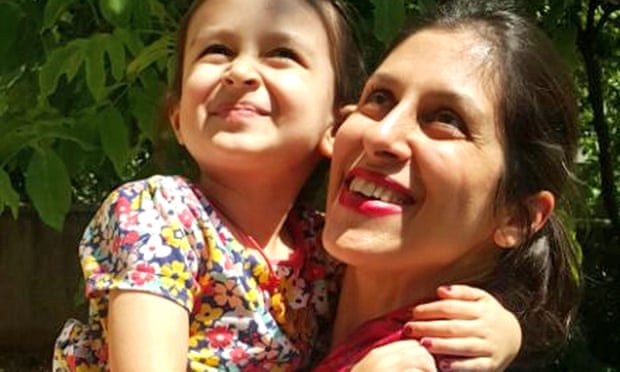What diplomatic protection will mean for Nazanin Zaghari-Ratcliffe
Rarely used procedure implemented by Foreign Office to increase pressure on Iran

A free daily email with the biggest news stories of the day – and the best features from TheWeek.com
You are now subscribed
Your newsletter sign-up was successful
British-Iranian charity worker Nazanin Zaghari-Ratcliffe has been given diplomatic protection by the UK Foreign Office in an escalation of the campaign to get her freed from prison in Iran.
In a statement published this morning, Foreign Secretary Jeremy Hunt’s department said: “The Foreign Secretary has today decided that the UK will exercise diplomatic protection in the case of Nazanin Zaghari-Ratcliffe as part of the Government’s continuing efforts to secure her release.”
Diplomatic protection is a “rarely used tool under international law, which gives a country the right to challenge another state over the treatment of one of its nationals or companies”, says Sky News. It formally elevates a dispute from being a consular matter to being a formal state-to-state issue, and officially functions as a way for countries to take action on behalf of a national whose rights have been breached by another country.
The Week
Escape your echo chamber. Get the facts behind the news, plus analysis from multiple perspectives.

Sign up for The Week's Free Newsletters
From our morning news briefing to a weekly Good News Newsletter, get the best of The Week delivered directly to your inbox.
From our morning news briefing to a weekly Good News Newsletter, get the best of The Week delivered directly to your inbox.
Diplomatic protection can take the form of “consular action, political and economic pressure, negotiations with the other state, judicial proceedings or other forms of peaceful dispute settlement”, says the i news site.
It is different to diplomatic immunity, which applies to accredited diplomats and provides them with immunity from prosecution for most crimes when serving abroad.
Zaghari-Ratcliffe was arrested at Tehran airport with her one-year-old daughter, Gabriella, in April 2016 following a visit to her family. She was subsequently sentenced to five years for spying - an accusation she has denied.
Her daughter, now four, lives with her maternal grandparents in Iran, and has not seen her British father for three years.
A free daily email with the biggest news stories of the day – and the best features from TheWeek.com
The move to give Zaghari-Ratcliffe diplomatic protection is based on UK government claims that her treatment “fails to meet Iran’s obligations under international law”, and is “likely to lead to increased tensions between the two countries”, The Guardian suggests.
BBC diplomatic correspondent James Landale says that the jailed woman’s new legal status will not force Iran to change the way it treats her, but “will allow Britain to raise her case with greater ease at international forums such as the United Nations”.
Hunt said today that the move “is unlikely to be a magic wand that leads to an overnight result”, but added that it “demonstrates to the whole world that Nazanin is innocent and the UK will not stand by when one of its citizens is treated so unjustly”.
This is first time in recent history that this diplomatic tool has been implemented, with Hunt admitting the step was “very unusual”.
-
 5 calamitous cartoons about the Washington Post layoffs
5 calamitous cartoons about the Washington Post layoffsCartoons Artists take on a new chapter in journalism, democracy in darkness, and more
-
 Political cartoons for February 14
Political cartoons for February 14Cartoons Saturday's political cartoons include a Valentine's grift, Hillary on the hook, and more
-
 Tourangelle-style pork with prunes recipe
Tourangelle-style pork with prunes recipeThe Week Recommends This traditional, rustic dish is a French classic
-
 Epstein files topple law CEO, roil UK government
Epstein files topple law CEO, roil UK governmentSpeed Read Peter Mandelson, Britain’s former ambassador to the US, is caught up in the scandal
-
 Iran and US prepare to meet after skirmishes
Iran and US prepare to meet after skirmishesSpeed Read The incident comes amid heightened tensions in the Middle East
-
 Which way will Trump go on Iran?
Which way will Trump go on Iran?Today’s Big Question Diplomatic talks set to be held in Turkey on Friday, but failure to reach an agreement could have ‘terrible’ global ramifications
-
 Israel retrieves final hostage’s body from Gaza
Israel retrieves final hostage’s body from GazaSpeed Read The 24-year-old police officer was killed during the initial Hamas attack
-
 China’s Xi targets top general in growing purge
China’s Xi targets top general in growing purgeSpeed Read Zhang Youxia is being investigated over ‘grave violations’ of the law
-
 Panama and Canada are negotiating over a crucial copper mine
Panama and Canada are negotiating over a crucial copper mineIn the Spotlight Panama is set to make a final decision on the mine this summer
-
 Iran unleashes carnage on its own people
Iran unleashes carnage on its own peopleFeature Demonstrations began in late December as an economic protest
-
 How oil tankers have been weaponised
How oil tankers have been weaponisedThe Explainer The seizure of a Russian tanker in the Atlantic last week has drawn attention to the country’s clandestine shipping network